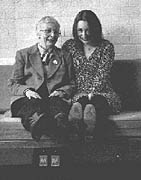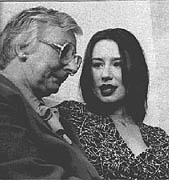
|
The Sunday Times (U.K.)
|

|
The Sunday Times (U.K.)
|
On May 24, 1998, an article about Tori and her mom appeared in The Sunday Times in the U.K. This is an incredible article where Tori talks about her mom and her mom talks about Tori. I found this really interesting reading. This is the first time that Tori's relationship with her mother has been detailed in such a manner. It is very honest and touching. Special thanks to John Davies and Sabrina for sending me the article and to John Davies for sending me the photos. Thanks to Ken Tough for telling me about this.
Article in The Sunday Times Magazine, UK, 24 May 1998


Click on either photo to see it larger.
The pic of Tori & Mother on the seat is only a partial scan- the bit seen here is the middle third of the pic, the rest showed the ends of the seat. They also used the pic of Tori at piano at two-and-a-half, that's been in the biographies.
Relative values
Tori Amos, singer/songwriter, and her part-Cherokee mother, Mary Ellen Amos. By Nigel Williamson. Photographs by Martin Morrell.
Tori Amos, 33, born Myra Ellen Amos, was brought up in America but found fame as a singer and songwriter after moving to Britain in 1991. She first attracted attention with the song Me and a Gun, after she was raped at gunpoint in Los Angeles. The chart-topping albums Under the Pink and Boys for Pele followed, and her latest offering From the Choirgirl Hotel, is released this month. In 1994 she helped found the American telephone helpline RAINN (Rape, Abuse and Incest National Network). She is married to Mark Hawley, a sound engineer and lives in Cornwall. Her mother Mary Ellen, comes from Cherokee stock. She married a Methodist minister and served the church in Baltimore, Ohio, for more than 40 years until her husband's retirement.
Tori: My mother's family and my father's are worlds apart. She is part-Cherokee, and there's a very spiritual aspect to her. My father came from a very rigid household. Both his parents were ordained ministers... I'm afraid I get Tourette's syndrome when I talk about Christianity „ though my mother rolls her eyes when I say this.
She is a very loyal Christian woman, but she has a spirituality that goes beyond that. She has premonitions and dreams, but she keeps her esoteric side to herself. She made me very familiar with the Cherokee blood in us. I remember she used to read me stories. I had a brother and a sister, but they were 7 and 10 years older, so my mother and I formed a special bond. She says I played music before I could talk, and I would play the piano for her. I was very close to her father, too. He had a real temper, which she says I inherited. He had been raised by his grandmother, a full-blood Cherokee called Margaret Little, and he would tell stories about her. When soldiers burnt the South to the ground in the civil war, there was nothing to eat, so she harnessed the plough to her body and planted the seeds. Margaret Little gave me a sense of integrity. I like her tenacity. She was a survivor, and I share that inspiration with my mother.
They say I was a child prodigy but at four years old I was fighting all the dogma of the church and I put my passion into the piano. I went to the Peabody Conservatory to study music when I was five. I was kicked out when I was 11, and I think my father was very disappointed. But my mother knew I was constricted there.
When I was 13 I started playing in clubs and bars. My parents had to chaperone me. My father's congregation freaked out. My mother understood the journey I was on, but there were huge screaming matches between me and my father over religious differences, which pained her a lot.
When I was 21 I went to Los Angeles. I was just in heaven, and I loved not having to go to church „ because I'd been in the choir until I was 15, and then I was the choir director until I was 21.
Unfortunately I didn't realise how my leaving home affected my mother. After I moved to LA I was raped. I wrote the song Me and a Gun about that, but I haven't talked to my mother or anyone about it. She's aware of what happened, but I've never discussed the details. I don't think she could bear it. I have a shrink and I deal with it through that.
When the first album came out and failed, she was hurt, but only for me. She isn't interested in success in that commercial way. She asks what your intention was and whether you have achieved what you set out to do.
The 1980s were not my mother's favourite fashion decade. She's very Jackie Kennedy, in a pillbox hat and a suit, whereas I was shopping at Retail Slut. I suppose I looked like something out of a freak show. But these days she's very comfortable in the rock'n'roll world. When I'm on tour she'll come to the show and she loves it.
She adores young people. I can turn to her when I'm troubled. We have good talks, and she's very stabilising. You can't buy my mother. And she's never been seduced by the fame side of it - she doesn't want to go to the Grammy awards, although she'll go if I invite her.
Since I've been living in Britain she's been coming to stay, and it's very comforting to have her around. She's a very Christian Southern lady and she knows just how to behave.
Mary Ellen: Before Tori could even talk, she hummed. By the time she was two-and-a-half she would walk over to the piano and copy exactly what her brother or sister had just been practicing. She used to get up in the morning before anyone else and play. The piano was her playmate, and she could reproduce anything she heard by ear „songs on the radio or even entire scores.
Her father and I were serving a church in the suburbs of Baltimore with about 1300 members, and she was singing in the choir before she was three. When she was four the choir director encouraged us to take her to the Peabody Conservatory of Music. They thought we were just pushy parents, but we had several piano teachers who said they couldn't teach her anything, and eventually the conservatory agreed to audition her. She played a selection from Oliver! and The Sound of Music. Then she played a classical piece and they started listening. They'd never taken anyone under nine, but they made an exception, and when they realised that on a clergyman's salary we couldn't afford it, they gave her a scholarship. The principal put her hand on my arm and said, "God has given you the responsibility of raising this very rare child, and she has to be given every opportunity!'
Learning to read music was the first difficult thing Tori encountered. She used to offer to do her brother's and sister's chores if they would play her music for her, because once she'd heard it she could play it by ear. She was in a group of students who were teenagers, and there she was, this little thing whose feet couldn't reach the pedals. Tori says the conservatory kicked her out. But what happened was that they cloned you to play in their classical way, and we could see her interest dwindling.
I felt it was important that Tori knew about her Cherokee heritage. We would sit on the porch on summer evenings, and my father would speak of the culture and tell stories about his full-blood Cherokee grandmother. We come from a line of strong women, and she too has been blessed with that strength.
I don't think Tori had a strict upbringing, but she probably thought so. My husband was a wonderful preacher, and we would discuss what he was preaching with the children. Tori questioned it all from the start, and we didn't really know how to answer her. She felt women were cheated in the church. I think she's wrong but I accept that God speaks to us all differently. Tori had an inquiring mind and was very outspoken, which got her into trouble. She spent a lot of time at school standing in the corner.
Most of the time the congregation loved her, although she did some outlandish things. She was a wonderful choir director, but she used to come into church in red leather pants. She loved to shock and she still does. The young people in the choir would do anything for her, but some of the mothers didn't think too much of her. They made sarcastic remarks, which she hid from me. She'd come home and be wiping away the tears, and I didn't understand how cruel people were being.
By the time she was a teenager, the drugs were coming into the schools. Her friends were getting into them, and she was losing interest in the piano. Her father asked whether, if he got her a job playing the piano, she'd continue practicing. She said yes; and just before she was 13 she auditioned at a bar called Mr Smith's. She got the job and played there every Friday night for a year. Because she was underage she had to be chaperoned. I'd never been in a bar, but we took it in turns. We got letters accusing us of being bad parents. There was a vote in the church about whether they could support the minister and his wife. We said we had to back our daughter or lose her, and they voted to support us.
When Tori left home, it was the worst thing that happened in my life. We'd shared so much. She was always the child-woman. At times it was as if she was the teacher and we were the children. She had this drive within her, and on her 21st birthday she said she had to go. We put her on a plane to LA „ she didn't know anybody there. Then she changed her name. She was the fifth generation of Ellens in the family, but she'd always hated her name.
She's had devastating experiences. When she called me on the phone that morning after she was raped I got on the next plane. I still can't speak of it, but I know the fact that she has been able to help other people through RAINN has been therapeutic.
We came over to England to see her get married in February, and I love to see her play. She gives everything on stage „ when she comes off she's totally limp. We're usually the only white-haired people at her concerts „ but we've met some of the real rockers and they've been so nice to us. I find young people very stimulating, because they aren't yet cast in society's mold. I can't be grateful enough to her for letting me share that world.
Copyright 1998 Times Newspapers Limited
Please give me feedback, comments, or suggestions about my site. Email me (Michael Whitehead) at mikewhy@iglou.com![]()